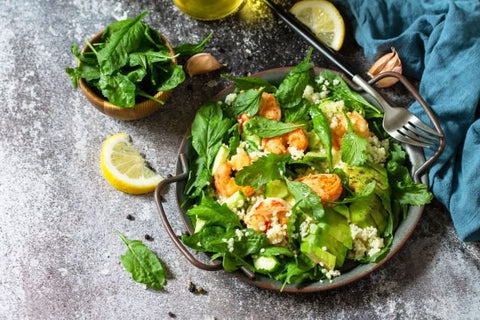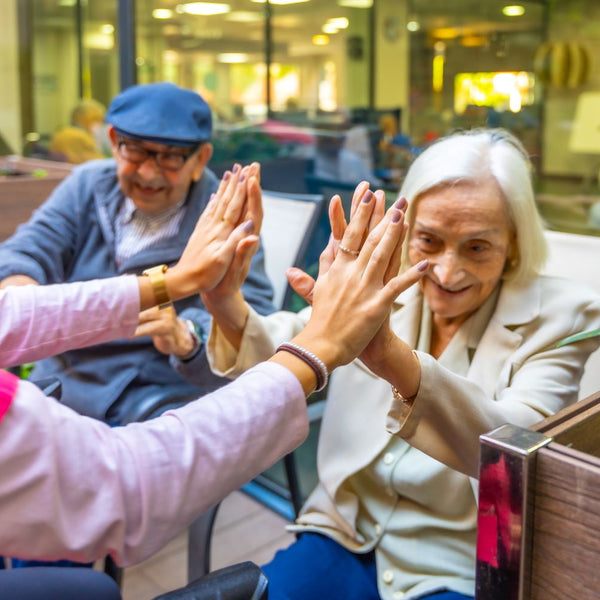Maintaining a healthy and balanced diet in older age is really important, because it gives your body everything it needs to support wellbeing and can even help prevent some health conditions from developing or worsening.
But it isn’t always straightforward for many older people to change long-standing eating habits or try new things, and the current cost-of-living crisis adds an extra challenge for healthy eating on a budget.
In this article, we explain why healthy eating in old age is so important, and how to plan meals and cook healthily in a straightforward and cost-effective way.
Jump to:
- How does diet affect the elderly?
- What should be included in a healthy diet for an older person?
- Why is adopting a healthy diet difficult for some older people?
- Tips for introducing budget-friendly healthy eating to the elderly
How does diet affect the elderly?
When it comes to the regular diet for any older person, the choices that you make can have a significant impact on your physical health.
As we age, our metabolism and nutritional needs can change. This, combined with the declining levels of activity that comes with ageing, often means that the usual meals and diet that you’ve enjoyed for many years are no longer the best for your optimum health and wellbeing.
It's also fairly common for some older people to lose their appetite to a degree, which can mean that they are not getting a healthy diet with the right nutrients either.
Some of the health conditions that diet can have a big impact on include:
- Type 2 diabetes, which can sometimes be reversed with changes to diet and lifestyle. Read more about the signs of type 2 diabetes
- Osteoporosis
- High blood pressure
- High cholesterol
- Heart disease
What should be included in a healthy diet for an older person?
As you age, the changes that happen to your body and lifestyle often means that fewer calories are required, especially if you’re becoming less active; or if you have the right balance of nutrients, it may be that you need to adjust portion sizes too.
Finding healthy and easy to eat foods for elderly people is always about balance, along with changing activity levels and other lifestyle choices, but can be a great support for wellbeing in later years.
For the diet itself, it’s important that elderly people include plenty of these nutrients in their meals:
- Calcium – to help minimise the risk of bone density loss (osteoporosis). Calcium is in dairy products like milk, yogurt, and cheese. However, these foods can be high in fat, so it’s important to choose low-fat varieties if you can. Calcium is also found in canned fish with bones, such as sardines and in certain vegetables like broccoli, spinach, and cabbage, as well as in tofu and soya beans.
- Iron – which helps the body produce cells that carry oxygen throughout. Iron can be found in red meat as well as in pulses like peas, lentils and beans, oily fish, bread, eggs, and breakfast cereals that have been fortified with iron and green vegetables.
- Vitamin C – helps the body absorb iron and can be found in fruit (and especially in citrus fruits), peppers, tomatoes, potatoes, and green vegetables.
- Vitamin D – to help maintain healthy bones, teeth, and muscle. Most vitamin D is gained from sunlight rather than food, so for older people who perhaps spend more time indoors, a daily vitamin D supplement all year round is good idea.
- Folic acid – which can help maintain cognitive function and is found in brown rice, bread, green vegetables, and fortified breakfast cereals.

Why is adopting a healthy diet difficult for some older people?
There’s a variety of different challenges that can make adopting a new, healthier diet for the elderly quite difficult in some cases.
These include:
Not wanting to change lifelong eating habits
While this certainly isn’t true of all older people, some people become very ingrained in their eating habits over time and can be resistant to changing the meals that they eat for healthier options or new recipes.
Not knowing how to make healthier meals
Many older people have used the same recipes and meals for years, often handed down from past generations, and can find the idea of doing things differently very daunting.
Even substituting some ingredients for healthier options can be something they are resistant to, as they often want things to taste and turn out the same as they always have. Using different cooking techniques, newer technologies or changing how parts of a meal is prepared aren’t always easy for someone used to doing things a certain way.
Healthy fresh vegetables and fruit can be expensive
Many older people live on a fixed income and the current cost-of-living crisis is seeing food costs rise significantly.
Healthy foods, such as fresh fruit and vegetables, often seem to be affected more by price increases than things like less healthy processed foods, which are frequently high in fat, sugar, and salt.
The cost of cooking
It isn’t just the cost of the ingredients and food itself that needs to be considered, but also the cost of turning that into a healthy meal.
With energy prices at very high levels and more increases expected, running ovens, hobs and other kitchen appliances is something that lots of people are worried about now.
Not wanting to try new foods
Some older people prefer to stick to the food and ingredients that they know well and have enjoyed for many years, rather than trying something new or unknown that is a healthier option or contains nutrients they might not get from their current diet.
Our supermarkets are now full of products with different flavours and textures from around the world that simply weren’t available decades ago, and with food costs being high, taking a risk on something new and healthy to eat may, understandably, be a no-go.
Eating and preparing meals is becoming more challenging in itself
For some older people, especially if they are becoming less mobile, frailer, or perhaps have arthritis in their hands or wrists that can limit movement, tasks like chopping vegetables, stirring meals as they cook, and clearing up after eating can be very challenging.
If you couple this with a potentially reduced appetite, some older people may feel that the effort of cooking a healthy meal isn’t perhaps worth it when there are convenience foods that do the job instead.
Tips for introducing budget-friendly healthy eating to the elderly
If your older loved one would benefit from some changes to their diet, it can be difficult to broach the subject with them. Talking to the elderly about changes to their lifestyle is important, but they need to be able to make their own independent choices and feel in control over their diet to make sure any changes are sustainable over time.
Not every older person will necessarily be open to significantly changing their diet and other eating and cooking habits, but some small changes can make a big difference over time. Some ideas include:
- Cooking with them, while substituting some ingredients for healthier options in meals they already enjoy. You can show them first-hand, so they know how to make some of their favourite meals a bit healthier themselves in the future.
- Taste-testing healthy new ingredients and meals together to see what’s a hit and what’s a miss.
- Using frozen or tinned fruit and vegetables to keep costs down. Frozen or tinned fruit and vegetables are a good alternative over fresh produce. They still have all the nutritional value but are often far cheaper, keep for much longer and are readily available in most supermarkets. Tinned vegetables are also often part or fully cooked before being tinned, so the costs of cooking them is also lower as they only need reheating in many cases.
-
Using a slow cooker rather than a regular oven for some meals. Slow cookers are low-cost to buy, very economical to use compared to gas or electric ovens, and are ideal for batch cooking meals like stews, casseroles, soups and more.
Batch cooking will usually work out much cheaper than cooking individual meals separately and anything you cook can be portioned out and frozen as needed, to be eaten later after defrosting and reheating in the microwave. Slow cookers also keep the cooking process very simple, with everything in one pot, and that also makes for minimal washing up. -
Seeing if they need some help with cooking and other domestic tasks. Many older people won’t tell anyone if they start to struggle with household tasks like cooking and cleaning, which can make good nutrition suffer.
Looking for signs that your older loved one might need some assistance can help to highlight that their care needs might be changing. You can use a product such as smart home sensor to monitor their use of appliances like the fridge and kettle (in a non-intrusive way), which can highlight if there are changes to the routine or appliances aren’t being used as often as they perhaps should be.

Helping your older loved one to find healthy and budget-friendly meals, that they genuinely enjoy, will give you peace of mind that they’re getting the balanced nutrition they need, especially when you aren’t with them.
Along with getting the right kind of exercise, this can be essential for their wellbeing, throughout winter and all year round.
Find out more about personal alarms
If you would like the additional peace of mind of a personal alarm system so that your loved one can always reach help if needed, either when at home or when out and about, we can help.
Find the right personal alarm for your specific situation or call our customer service teamif you’d like more help on finding the right system for your circumstances.

